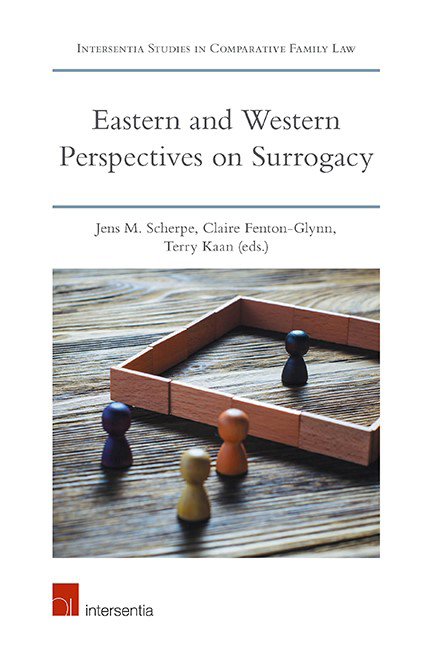Book contents
- Frontmatter
- Preface and Acknowledgements
- Contents
- List of Contributors
- Introduction
- Questionnaire
- PART I WESTERN PERSPECTIVES
- THE PROHIBITIVE APPROACH
- THE TOLERANT APPROACH
- THE REGULATORY APPROACH
- THE FREE MARKET APPROACH
- Russia
- United States of America
- THE INFLUENCE OF INTERNATIONAL COURTS
- PART II EASTERN PERSPECTIVES
- THE PROHIBITIVE APPROACH
- A TOLERANT APPROACH?
- REGULATION THROUGH PROFESSIONAL MEDICAL BODIES
- FROM FREE MARKET TO REGULATION
- PART III COMPARATIVE PERSPECTIVES ON SURROGACY
- Index
- About the Editors
Russia
from THE FREE MARKET APPROACH
Published online by Cambridge University Press: 26 June 2019
- Frontmatter
- Preface and Acknowledgements
- Contents
- List of Contributors
- Introduction
- Questionnaire
- PART I WESTERN PERSPECTIVES
- THE PROHIBITIVE APPROACH
- THE TOLERANT APPROACH
- THE REGULATORY APPROACH
- THE FREE MARKET APPROACH
- Russia
- United States of America
- THE INFLUENCE OF INTERNATIONAL COURTS
- PART II EASTERN PERSPECTIVES
- THE PROHIBITIVE APPROACH
- A TOLERANT APPROACH?
- REGULATION THROUGH PROFESSIONAL MEDICAL BODIES
- FROM FREE MARKET TO REGULATION
- PART III COMPARATIVE PERSPECTIVES ON SURROGACY
- Index
- About the Editors
Summary
GENERAL LEGAL FRAMEWORK
SOME INTRODUCTORY COMMENTS
The first time Russian law introduced provisions on assisted reproduction was in 1990, when Russia was still part of the Soviet Union. Although there were just two legal rules in that law, they were important and still exist in the current Russian legal regulation, albeit with a slightly modified wording. The first one stated that a husband who consented to assisted reproduction with donor insemination of his wife should be registered as the father of a child born to his wife. Under the second one, a person, who was registered as a child ‘s father by that person’ s application or joint application with the child ‘s mother, should not be able to contest that person’ s paternity at a later stage provided, if, at the moment of presenting a paternity application, that person knew that he actually was not the child's biological father.
These provisions established that assisted reproduction should be understood as an imitation of natural procreation and to a significant extent shaped a general approach of future Russian regulation in the area of assisted reproduction, including surrogate motherhood. This approach, in turn, derived from understanding of assisted reproduction as fertility treatment. It was first formally stated in the Fundamental Principles of Legislation on Protection of Citizens ‘Health 1993 that stipulated the’ right of every adult woman of childbearing (procreative) age to assisted reproduction and embryo implantation ‘(s. 35). It was further developed in the Law on Protection of Citizens’ Health 2011 (s. 55), which is currently a standing law and which will be dealt in more detail later. Here, it is just important to note two points. Firstly, the 2011 Law says that a man and a woman, married as well as not married, have the right to have access to assisted reproduction technologies, provided they gave their mutual informed consent to medical interference.
- Type
- Chapter
- Information
- Eastern and Western Perspectives on Surrogacy , pp. 281 - 306Publisher: IntersentiaPrint publication year: 2019
- 2
- Cited by



